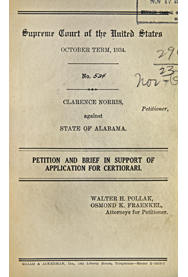The Rights of the Accused
The most enduring provision of Magna Carta - the protection against the loss or seizure of life, liberty or property without the "judgment of peers" or the "law of the land" - was associated early on with due process. In the US Bill of Rights, procedural due process is expressed in similar rights. In addition to the right to speedy and public trial by jury in criminal cases, are protections against unreasonable searches and seizures, and warrants issued without probable cause. Rights to counsel, to know the charges and produce defense witnesses, and the prohibition against forced testimony against oneself, among others, fill out a strong foundation for procedural justice.
These provisions have not always been upheld, and have also led to new interpretation. During the Civil War, President Lincoln famously suspended habeas corpus, the historic protection against arbitrary imprisonment. In 1863, in the wake of the Dakota War, military commissions tried members of the Sioux in Minnesota, though they were not US citizens. These resulted in 38 executions, with 264 death sentences commuted by Lincoln. Shown in the exhibit are Lincoln's orders to lift the death sentence of one Native American and pardon another. Following Lincoln’s assassination in 1865, his surviving conspirators were also tried by military commissions. In the following year, ex parte Milligan (1866) found that US citizens should not face military commissions where civilian courts were available.
In the 20th century, issues of procedural due process have been equally important. In Norris v. Alabama (1935), an opinion on the "Scottsboro Boys" trials, the Supreme Court found that young African-Americans accused of rape could not get a fair trial before the exclusively white juries of Jackson County, Alabama. The highest court found, in Mapp v. Ohio (1961), that evidence from warrantless and illegal searches and seizures was inadmissible in court, an issue that is subject to nuanced interpretation today. After the landmark Miranda v. Arizona (1966), suspects in custody have had to be "Mirandized," or read their rights to remain silent and to counsel during interrogation.
More recently, US responses to terrorism have drawn close attention to due process. In the past decade, Guantanamo Bay detainees in particular have been involved in several notable Supreme Court cases. In Hamdi v. Rumsfeld (2004), the Court recognized the constitutional due process rights of enemy combatants who are US citizens. Hamdan v. Rumsfeld (2006) found that the executive branch could not establish military commissions without congressional approval, and in Boumediene v. Bush (2009) the Court held that Guantanamo Bay detainees could avail themselves of habeas corpus petitions. Due process continues to be an important and contested issue, and draws even today on a long legacy of English and American law that can be traced back to principles articulated in Magna Carta.
![Title page of [Book title start] The Sioux War What Has Been Done by the Minnesota Campaign of 1863 [Book title end].](../riesenfeld_images/magnacarta/images/xxxtaylorSioux1863thumb.png)

![Title page of [Book title start] An Argument to Establish the Illegality of Military Commissions in the United States [Book title end].](../riesenfeld_images/magnacarta/images/xxxmiliCOmmAssassin06_1865thumb.png)
![Title page of [Publication title start] Opinion on the constitutional power of the military to try and execute the assassins of the President [Publication title end].](../riesenfeld_images/magnacarta/images/xxxoppeexcuassassin07_1865thumb.png)

